by Susan Flantzer
© Unofficial Royalty 2012, revised 2022

A gathering of members of the Romanov family in Livadia, Crimea, Russia, 1891. (The boys on the ground) Grand Duke Alexei Mikhailovich, Grand Duke Michael Alexandrovich, and brothers Grand Dukes Andrei and Boris Vladimirovich (Seated) Grand Duchess Xenia, Grand Duchess Maria Pavlovna the elder, Grand Duchess Elena Vladimirovna, Grand Duchess Alexandra Iosifovna, Empress Maria Feodorovna, Emperor Alexander III, Grand Duke Michael Nicholaievich, and Grand Duke Paul Alexandrovich. (Standing, 1st row) Dukes Carl Michael and Georg of Mecklenburg-Strelitz (great-grandsons of Emperor Paul I), Grand Duke Konstantin Konstantinovich, his sister Olga Queen of Greece, Tsarevich Nicholas (later Emperor Nicholas II), Grand Duke Vladimir Alexandrovich, Grand Duke Dimitri Konstantinovich (in the white hat), Duke Peter of Oldenburg (great-great-grandson of Emperor Paul I), and Duke George of Leuchtenberg (great-grandson of Emperor Nicholas I). (Standing, back row) Grand Duke Sergei Mikhailovich, Grand Duke Nicholas Nicholaievich the younger, Duke Alexander of Oldenburg (peering over the shoulder of Grand Duke Dimitri). ; Credit – Wikipedia
Although more attention is paid to the eighteen Romanovs who were horribly killed during the Russian Revolution, far more Romanovs and their spouses and children, their morganatic spouses and children, and other family members escaped Russia. Some struggled and some had successful lives. Quite a number of them lived long lives. Read more about them by using the links on their names. Unofficial Royalty links are noted with an asterisk*.
- Unofficial Royalty: Russian Titles and Patronymics
- Unofficial Royalty: Tsardom of Russia/Russian Empire Index
- Unofficial Royalty: Romanovs Killed During the Russian Revolution
All photos are from Wikipedia unless otherwise indicated.
At the time of the abdication of Nicholas II, Emperor of All Russia on March 15, 1917, these Romanovs were living in other countries:

Grand Duke Dmitri Pavlovich
Grand Duke Dmitri Pavlovich* (1891 – 1942), son of Grand Duke Paul Alexandrovich (son of Alexander II, Emperor of All Russia) who was killed by the Bolsheviks in January 1919, half-brother of Prince Vladimir Pavlovich Paley who was killed by the Bolsheviks in July 1918, Dmitri had been exiled to Persia (now Iran) for his role in the murder of Grigori Yefimovich Rasputin

Grand Duke Michael Mikhailovich
Grand Duke Michael Mikhailovich (1861 – 1929), son of Grand Duke Michael Nicolaievich (son of Nicholas I, Emperor of All Russia), Michael was living in exile in London, England because of his morganatic marriage to Countess Sophie von Merenberg, later Countess de Torby. His wife and three children were living with him in England. (see below)

Grand Duchess Maria Georgievna with her two daughters Princess Nina Georgievna and Princess Xenia Georgievna
Grand Duchess Maria Georgievna* (1876 – 1940), born Princess Maria of Greece and Denmark, wife of Grand Duke George Mikhailovich who was killed by the Bolsheviks in January 1919, Maria was visiting London, England when World War I began in 1914 and had been unable to return to Russia.
With Grand Duchess Maria Georgievna were her two teenage daughters:
Princess Nina Georgievna (1901 – 1974)
Princess Xenia Georgievna (1903 – 1965)
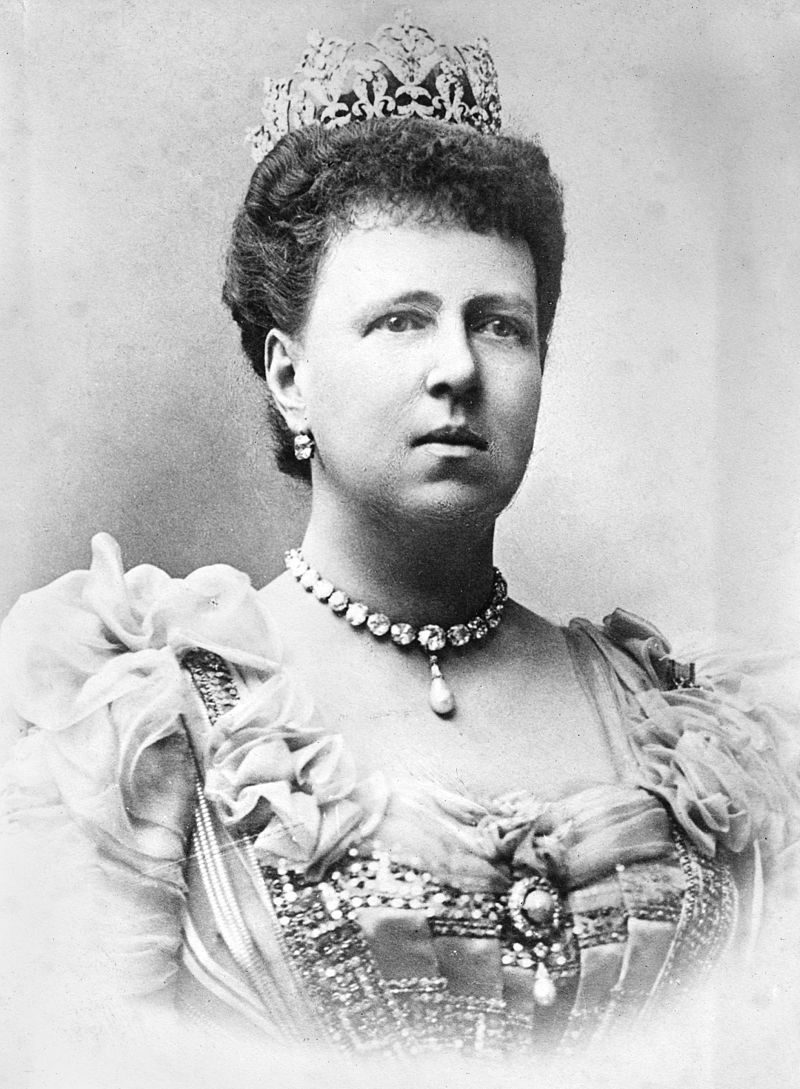
Grand Duchess Marie Alexandrovna, Duchess of Saxe-Coburg, Duchess of Edinburgh
Grand Duchess Marie Alexandrovna, Duchess of Saxe-Coburg, Duchess of Edinburgh* (1853 – 1920), daughter of Alexander II, Emperor of All Russia, widow of Prince Alfred, Duke of Saxe-Coburg and Gotha, Duke of Edinburgh (son of Queen Victoria), Marie was living in the Duchy of Saxe-Coburg and Gotha, now in Germany

Grand Duchess Anastasia Mikhailovna, Grand Duchess of Mecklenburg-Schwerin
Grand Duchess Anastasia Mikhailovna, Grand Duchess of Mecklenburg-Schwerin* (1860 – 1922), daughter of Grand Duke Michael Nicolaievich (son of Nicholas I, Emperor of All Russia), wife of Grand Duke Friedrich Franz III of Mecklenburg-Schwerin, Anastasia was living in France. Three of her six brothers were murdered by the Bolsheviks: Grand Duke Sergei Mikhailovich in July 1918 and Grand Duke Nicholas Mikhailovich and Grand Duke George Mikhailovich in January 1919.

Grand Duchess Elena Vladimirovna, Princess of Greece and Denmark
Grand Duchess Elena Vladimirovna, Princess of Greece and Denmark* (1882 – 1957), daughter of Grand Duke Vladimir Alexandrovich (son of Alexander II, Emperor of All Russia), wife of Prince Nicholas of Greece and Denmark, Elena was living in Greece
*********************
At the time of the abdication of Nicholas II, these Romanov morganatic wives and children from morganatic marriages were living in other countries:
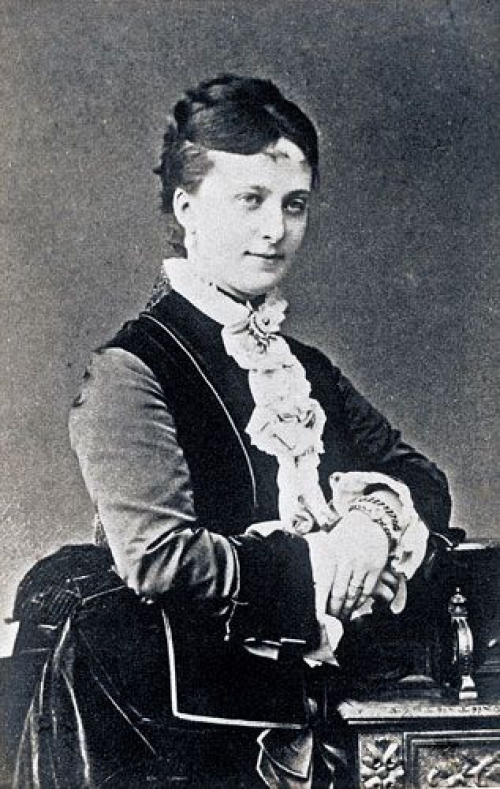
Princess Ekaterina Mikhailovna Dolgorukova, Princess Yurievskaya
Princess Ekaterina Mikhailovna Dolgorukova, Princess Yurievskaya* (1847 – 1922), morganatic second wife and widow of Alexander II, Emperor of All Russia, was living in France. Ekaterina had left Russia shortly after the assassination of her husband Alexander II in 1888

Princess Olga Alexandrovna Yurievskaya, Countess von Merenberg
Princess Olga Alexandrovna Yurievskaya, Countess von Merenberg (1874 – 1925), daughter of Alexander II, Emperor of All Russia and his morganatic second wife Princess Ekaterina Mikhailovna Dolgorukova, Princess Yurievskaya, Olga was the wife of Count Georg Nikolaus von Merenberg and was living in Prussia, now part of Germany

Countess Sophie Nicholaievna Torby
Countess Sophie Nikolaievna of Merenberg, Countess de Torby (1868 – 1927), morganatic wife of Grand Duke Michael Mikhailovich (grandson of Nicholas I, Emperor of All Russia), Sophie was living in London, England with her husband and three children:
Countess Anastasia Mikhailovna de Torby (1892 – 1977)
Countess Nadejda Mikhailovna de Torby* (1896 – 1963), married George Mountbatten, 2nd Marquess of Milford Haven, Nadejda was an aunt by marriage of Prince Philip, Duke of Edinburgh
Count Michael Mikhailovich de Torby (1898 – 1959)

Grand Duke Michael Mikhailovich (right) with his children (from left to right), Nadejda, Michael, and Anastasia
*********************
These Romanov morganatic wives and children from morganatic marriages managed to escape:

George Mikhailovich Brasov, Count Brasov
George Mikhailovich Brasov, Count Brasov (1910 – 1931), son of Grand Duke Michael Alexandrovich (son of Alexander III, Emperor of All Russia and brother of Nicholas II, Emperor of All Russia) who was killed by the Bolsheviks in 1918 and his morganatic wife Countess Natalia Sergeievna Brassova – After his father was arrested on March 7, 1918, his mother, concerned for his safety, arranged to have George and his nanny smuggled out of Russia with the help of the Danish Embassy. George and his nanny safely reached the Danish Embassy in Berlin where they were given shelter by the ambassador Count Carl Moltke.

Countess Natalia Sergeievna Brasova
Countess Natalia Sergeievna Brasova* (1880 – 1952), morganatic wife of Grand Duke Michael Alexandrovich who was killed by the Bolsheviks in June 1918 (son of Alexander III, Emperor of All Russia and brother of Nicholas II, Emperor of All Russia) – After going through several periods of house arrests, Michael was arrested on March 7, 1918, along with his British secretary Nicholas Johnson, and imprisoned at the Bolshevik headquarters in St. Petersburg. Four days later, Michael and Johnson were sent to Perm, a thousand miles to the east. Natalia obtained a travel permit so she could join Michael in Perm. However, Michael and Natasha’s reunion did not last long. Because the Bolsheviks and the White Army were fighting in the area, Michael and Natasha feared that she could become trapped in Perm in a dangerous situation and so Natasha left on May 18, 1918, for Moscow. On June 13, 1918, Michael and his secretary were taken to the woods near Perm and shot. Their bodies have never been found.
Returning to Petrograd, which was the new name for St. Petersburg, Natasha immediately began to plan a second trip to be with Michael but she received a telegram from Perm about his “disappearance”. When she met with the Cheka, the Soviet secret police, Natalia accused them of killing Michael and she was put in prison. Ten weeks later she feigned illness and was transferred to a nursing home from which she managed to escape. The Germans believed the widespread rumors that Michael was still alive and decided to help Natalia escape Russia in an attempt to gain influence with Michael. Through the German-controlled Ukrainian consulate, Natalia and Tata, her 15-year-old daughter from her first marriage, were provided with false passports. They then traveled to Kyiv which was under German occupation and on to Odessa where they boarded the British destroyer HMS Nereide which took them to Constantinople.

Princess Ekaterina Alexandrovna Yurievskaya
Princess Ekaterina Alexandrovna Yurievskaya (1878 – 1959), daughter of Alexander II, Emperor of All Russia and his morganatic second wife Princess Ekaterina Mikhailovna Dolgorukova, Princess Yurievskaya. In 1917, Ekaterina was in Russia with her second husband Prince Sergei Platonovich Obolensky. Reportedly, she walked miles without food, suffering great hardship. Eventually, Ekaterina made her way to her mother in France.

Princess Olga Valerianovna Paley
Princess Olga Valerianovna Paley* (1865 – 1929), morganatic second wife of Grand Duke Paul Alexandrovich (son of Alexander II, Emperor of All Russia), who was killed by the Bolsheviks in January 1919, and mother of Prince Vladimir Pavlovich Paley who was killed by the Bolsheviks in July 1918

Princess Natalia Paley and Princess Irina Paley
and her two daughters:
Princess Irina Pavlovna Paley (1903 – 1990)
Princess Natalia Pavlovna Paley (1905 – 1981)
Later in 1919, after her husband’s execution had been confirmed, Olga, accompanied by her two daughters, fled Russia, hoping that her son Vladimir was still alive. With the help of a White Army officer, they walked for three days, crossing the frozen Lake Ladoga, the largest lake entirely in Europe. The Bolsheviks had installed light projectors around the lake which they used to find people attempting to escape. Many times Olga and her daughters had to lie down on the ice and be covered with a white sheet to avoid being seen. Olga, her daughters, and the White Army officer walked across the lake to Finland and continued to the safety of the city of Helsinki. Eventually, Olga and her daughters settled in France.
*********************
These Romanovs and family members managed to escape from Russia:

Left to right: Grand Duchess Kira Kirillovna, Grand Duchess Victoria Feodorovna, Grand Duchess Maria Kirillovna, and Grand Duke Kirill Vladimirovich
Grand Duke Kirill Vladimirovich* (1876 – 1938), son of Grand Duke Vladimir Alexandrovich (son of Alexander II, Emperor of All Russia)
Grand Duchess Victoria Feodorovna* (1876 – 1936), Kirill’s wife and first cousin, born Princess Victoria Melita of Edinburgh, daughter of Prince Alfred, Duke of Edinburgh, Duke and Saxe-Coburg and Gotha (son of Queen Victoria) and Grand Duchess Maria Alexandrovna of Russia (daughter of Alexander II, Emperor of All Russia)
and their two daughters:
Grand Duchess Maria Kirillovna (1907 – 1951)
Grand Duchess Kira Kirillovna (1909 – 1967)
Following the abdication of Nicholas II in 1917, Kirill and his family left Russia. They settled first in Finland, before moving on to Munich, Germany, and then Zurich, Switzerland. Eventually, they settled permanently in Saint-Briac, France, in the mid-1920s.
*******************
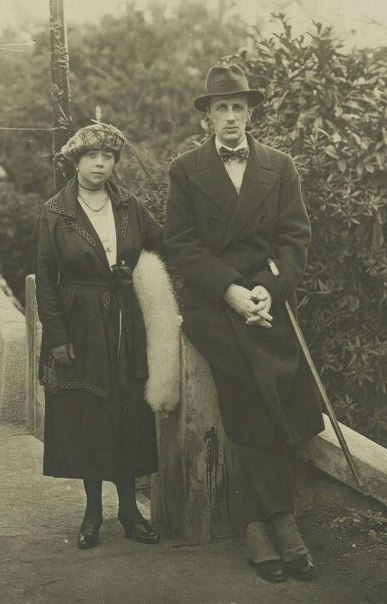
Prince Gavril Konstantinovich and his wife later Princess Romanovskaya-Strelninskaya
Prince Gavril Konstantinovich (1887 – 1955), son of Grand Duke Konstantin Konstantinovich (a grandson of Nicholas I, Emperor of All Russia), and a brother of Prince Ioann Konstantinovich, Prince Konstantin Konstantinovich, and Prince Igor Konstantinovich who were all killed by the Bolsheviks in July 1918
Antonina Rafailovna Nesterovskaya (1890 – 1950), Gavril’s morganatic wife, a ballerina at the Mariinsky Theatre in St. Petersburg, later Princess Romanovskaya-Strelninskaya
In July 1918, Gavril was imprisoned in Petrograd (St. Petersburg). His wife Antonina was tireless in her efforts to obtain Gavril’s release. She finally succeeded with the help of writer Maxim Gorky, who lobbied Vladimir Lenin, the first and founding head of government of Soviet Russia, on Gavril’s behalf. At the end of 1918, Gavril was moved to a hospital, and then Gavril and his wife lived for a while at Gorky’s apartment. In November 1918, with Gorky’s assistance, the Petrograd Soviet gave the couple permission to leave Russia for Finland. They eventually settled in France. Grand Duchess Elizabeth Mavrikievna, Gavril’s mother, his two youngest siblings, and the two children of his killed brother Prince Ioann Konstantinovich also escaped. See the next entry.
*******************

Grand Duchess Elizabeth Mavrikievna
Grand Duchess Elizabeth Mavrikievna (1865 – 1927), born Princess Elisabeth of Saxe-Altenburg, widow of Grand Duke Konstantin Konstantinovich (a grandson of Nicholas I, Emperor of All Russia), and mother of Prince Ioann Konstantinovich, Prince Konstantin Konstantinovich, and Prince Igor Konstantinovich who were all killed by the Bolsheviks in July 1918
and her two youngest children:
Prince George Konstantinovich (1903 – 1938)
Princess Vera Konstantinovich (1906 – 2001)


Prince George Konstantinovich and Princess Vera Konstantinovich
and Grand Duchess Elizabeth Mavrikievna’s two grandchildren, the children of her son Prince Ioann Konstantinovich who was killed by the Bolsheviks:
Prince Vsevolod Ioannovich (1914 – 1973)
Princess Ekaterina Ioannovna (1915 – 2007)

Princess Ekaterina Ioannovna and Prince Vsevolod Ioannovich with their great grandfather King Nicholas I of Montenegro
Swedish diplomats obtained permission for Grand Duchess Elizabeth Mavrikievna to leave Russia with the two children of her son Prince Ioann Konstantinovich (who were later reunited with their mother Princess Helen Petrovna – see below) and her own two younger children in October 1918 aboard the Swedish ship Ångermanland.
*******************

Grand Duchess Marie Pavlovna the Younger
Grand Duchess Marie Pavlovna the Younger* (1890 – 1958), daughter of Grand Duke Paul Alexandrovich of Russia (a son of Alexander II, Emperor of All Russia) who was killed by the Bolsheviks in January 1919

Prince Sergei Mikhailovich Putyatin
Prince Sergei Mikhailovich Putyatin (1893 – 1966), Maria Pavlovna’s second husband, divorced in 1923
Grand Duchess Marie Pavlovna and her husband Prince Sergei Mikhailovich Puliatin left Petrograd by train for the German-held south in July 1918. From there they moved to Austrian occupied Odessa and at the invitation of Queen Marie of Romania traveled to Romania in November 1918.
*******************
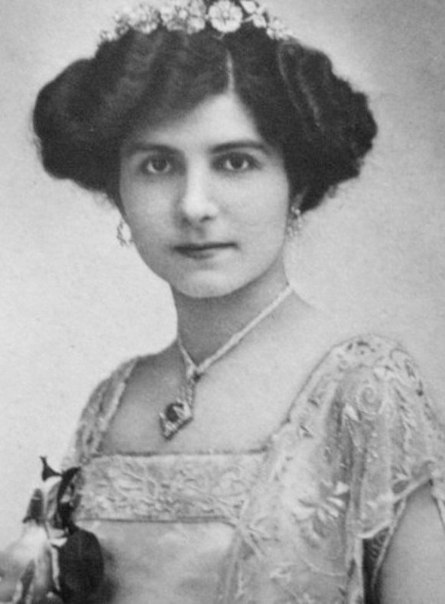
Princess Helen Petrovna
Princess Helen Petrovna (1884 – 1962), born Princess Helen of Serbia, widow of Prince Ioann Konstantinovich who was killed by the Bolsheviks in July 1918
Helen served as a nurse during World War I and then joined her husband in the Urals but she was arrested and was imprisoned in Perm and later Moscow. Through the intervention of neutral Norway, Helen was allowed to leave Russia in December 1918 and joined her children in Sweden.
*******************

Queen Olga of Greece
Queen Olga of Greece* (1851 – 1926), born Grand Duchess Olga Konstantinovna, widow of King George I of Greece, daughter of Grand Duke Konstantin Nikolaievich (son of Nicholas I, Emperor of All Russia), sister of Grand Duke Dmitri Konstantinovich killed by the Bolsheviks in January 1919
After the assassination of her husband in 1913, Olga returned to Russia. When World War I broke out, she set up a military hospital in Pavlovsk Palace, the home of her brother Grand Duke Konstantine Konstantinovich. After the Russian Revolution in 1917, Olga could not leave Russia until the Danish Embassy intervened. In December 1918, she escaped to Switzerland where her son King Constantine I of Greece was living since he had been deposed. Queen Olga was the paternal grandmother of Prince Philip, Duke of Edinburgh.
*******************

Grand Duke Alexander Mikhailovich
Grand Duke Alexander Mikhailovich* (1866 – 1933), son of Grand Duke Michael Nikolaevich (son of Nicholas I, Emperor of All Russia), husband of Grand Duchess Xenia Alexandrovna, daughter of Alexander III, Emperor of All Russia and sister of Nicholas II, Emperor of All Russia
and his eldest son and his pregnant daughter-in-law:
Prince Andrei Alexandrovich (1897 – 1981), son of Grand Duke Alexander Mikhailovich and Grand Duchess Xenia Alexandrovna
Elisabetta Ruffo-Sasso (1886 – 1940), wife of Andrei

Prince Andrei Alexandrovich
Grand Duke Alexander Mikhailovich had fled with his family to Crimea. He left Russia with his son Andrei and Andrei’s wife on the British ship HMS Forsythe in December 1918 to attend the Paris Peace Conference as the representative of the Romanov family, seeking support in western Europe for the White Army. Because of what was happening in Russia, they stayed in France.
*******************

The Romanovs under house arrest at Ai-Todor in the Crimea in 1918. Left to Right – Standing: Colonel Nikolai Kulikovsky (Grand Duchess Olga’s husband), Mr. Fogel, Olga Konstantinovna Vasiljeva, Prince Andrei (Grand Duchess Xenia’s son). Seated: Mr. Orbeliani, Prince Nikita (Grand Duchess Xenia’s son), Grand Duchess Olga, Grand Duchess Xenia, Empress Maria Feodorovna, Grand Duke Alexander (Grand Duchess Xenia’s husband). On the floor: Prince Vasili, Prince Rostislav, and Prince Dmitri (Grand Duchess Xenia’s sons)
Throughout 1917, a large number of Romanovs made their way to the Crimea and gathered at the Villa Ai Todor, the estate of Grand Duchess Xenia Alexandrovna. In February 1918, this group was split and the major members, including the Dowager Empress Marie Feodorovna, were placed under detention at the Villa Dulber near Yalta. The following month they were freed by the Germans who had occupied the area after signing the Treaty of Brest Litovsk. In the summer of 1918, they were moved to the Villa Harax near Sevastopol and joined the Ai Todor group in March 1919. They were all rescued in April 1919 by the British battleship HMS Marlborough which had been sent by King George V of the United Kingdom, the nephew of Dowager Empress Marie Feodorovna.
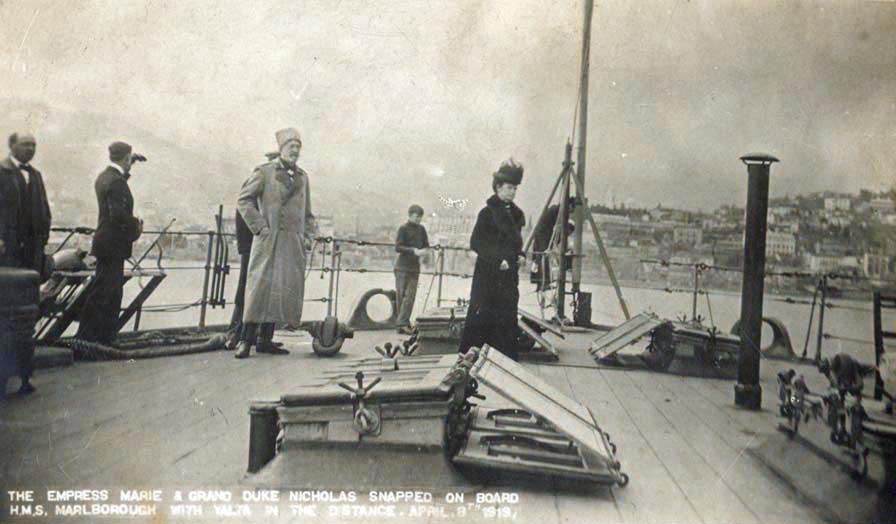
Grand Duke Nicholas Nikolaevich and Empress Maria Feodorovna aboard the British battleship HMS Marlborough
Aboard the battleship HMS Marlborough:

Empress Marie Feodorovna
Empress Marie Feodorovna* (1847 – 1928), born Princess Dagmar of Denmark, widow of Alexander III, Emperor of All Russia, mother of Nicholas II, Emperor of All Russia who was killed along with his family by the Bolsheviks in 1918, mother of Grand Duke Michael Alexandrovich who was killed by the Bolsheviks in 1918

Grand Duchess Xenia Alexandrovna
Empress Maria Feodorovna’s daughter:
Grand Duchess Xenia Alexandrovna* (1875 – 1960), daughter of Alexander III, Emperor of All Russia, wife of Grand Duke Alexander Mikhailovich (above), sister of Nicholas II, Emperor of All Russia who was killed along with his family by the Bolsheviks in 1918, sister of Grand Duke Michael Alexandrovich who was killed by the Bolsheviks in 1918

Prince Felix Felixovich Yusupov, Princess Irina Alexandrovna Yusupova and Princess Irina Felixovna Yusupova
and Xenia’s daughter, son-in-law, and granddaughter:
Princess Irina Alexandrovna Yusupova (1895 – 1970), daughter of Grand Duke Alexander Mikhailovich and Grand Duchess Xenia Alexandrovna
Prince Felix Felixovich Yusupov (1887 – 1967), Irina’s husband and one of the murderers of Grigori Yefimovich Rasputin
Princess Irina Felixovna Yusupova (1915 – 1983), daughter of Irina and Felix

Grand Duchess Xenia’s family: From left to right: Rostislav, Grand Duke Alexander, Grand Duchess Xenia, Vasili, Irina, Nikita (on the floor) Fyodor, Dmitri, Andrei
and Xenia’s five youngest sons, Xenia’s eldest son Andrei (see above) escaped with his wife and his father in 1918:
Prince Feodor Alexandrovich (1898 – 1968)
Prince Nikita Alexandrovich (1900 – 1974)
Prince Dmitri Alexandrovich (1901 – 1980)
Prince Rostislav Alexandrovich (1902 – 1978)
Prince Vassily Alexandrovich (1907 – 1989)

The Yusupov family in 1902: Prince Felix Felixovich Yusupov (the younger), Prince Nicholas Felixovich Yusupov (died in 1908), Prince Felix Felixovich Yusupov (the elder), and Princess Zinaida Yusupova
and the parents of Xenia’s son-in-law:
Prince Felix Felixovich Yusupov (1856 – 1928), born Count Felix Felixovich Sumarokov-Elston, was granted special permission by Alexander III, Emperor of All Russia to use the title Prince Yusupov
Princess Zenaida Nicholaievna Yusupov (1861 – 1939), the only heiress of Russia’s largest private fortune of her time

Grand Duke Nicholas Nikolaevich
Grand Duke Nicholas Nikolaevich (1856 – 1929), son of Grand Duke Nicholas Nikolaevich of Russia (son of Nicholas I, Emperor of All Russia), brother of Grand Duke Peter Nicholaievich below
and Grand Duke Nicholas Nikolaevich’s wife:
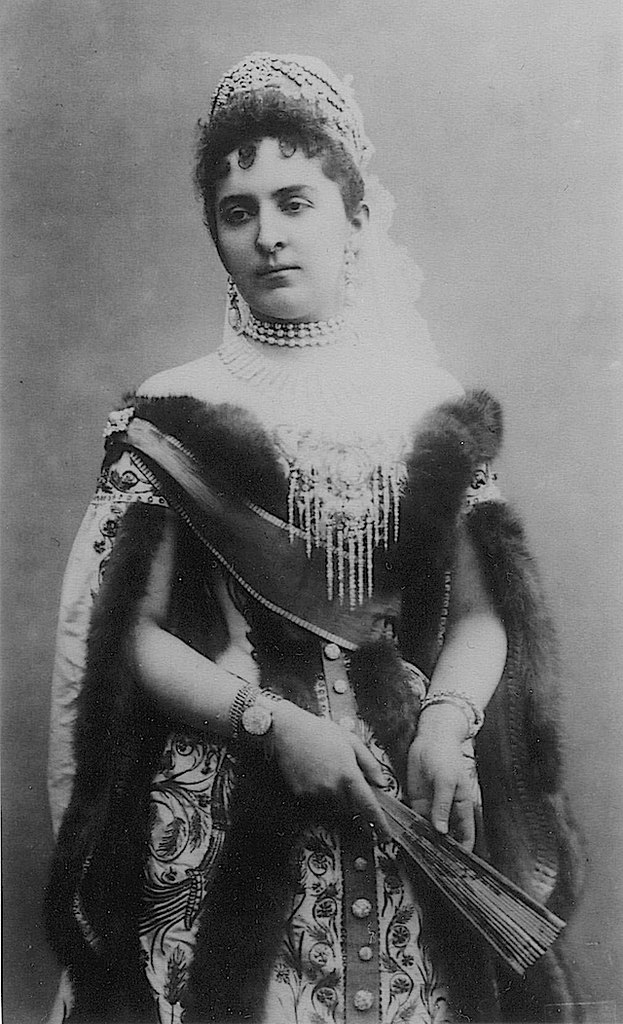
Grand Duchess Anastasia Nicholaievna
Grand Duchess Anastasia Nicholaievna (1868 – 1935), born Princess Anastasia of Montenegro, wife of Grand Duke Nicholas Nikolaevich, sister of Grand Duchess Militza Nicholaievna below
and Anastasia’s two children from a previous marriage and her son-in-law:

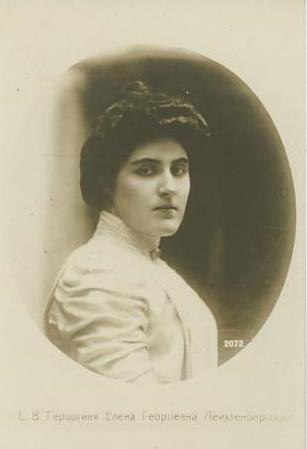
Prince Sergei Georgievich Romanowsky, 8th Duke of Leuchtenberg and Princess Elena Georgievna Romanovskaya, Duchess of Leuchtenberg
Prince Sergei Georgievich Romanowsky, 8th Duke of Leuchtenberg (1890 – 1974)
Princess Elena Georgievna Romanovskaya, Duchess of Leuchtenberg (1892 – 1971)
Count Stefan Tyszkiewicz (1894 – 1976), Elena’s husband

Grand Duke Peter Nicholaievich
Grand Duke Peter Nicholaievich (1864 – 1931), son of Grand Duke Nicholas Nikolaevich of Russia (son of Nicholas I, Emperor of All Russia) brother of Grand Duke Nicholas Nikolaevich above
and Grand Duke Peter Nicholaievich’s wife:
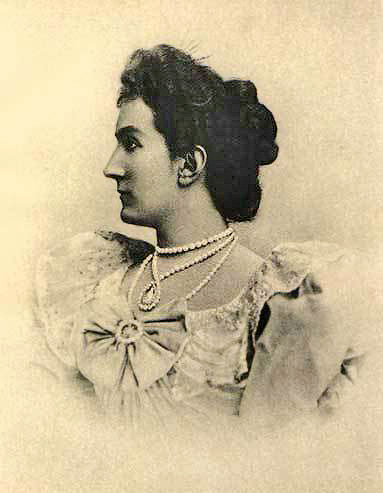
Grand Duchess Militza Nicholaievna
Grand Duchess Militza Nicholaievna (1866 – 1951), born Princess Milica of Montenegro, wife Grand Duke Peter Nicholaievich, sister of Grand Duchess Anastasia Nicholaievna above
and Peter and Militza’s three children, their son-in-law, and granddaughter:

Princess Marina Petrovna
Princess Marina Petrovna (1892 – 1981)
Prince Roman Petrovich (1896 – 1978)
Princess Nadezhda Petrovna Orlov (1898 – 1988)
Prince Nicholas Vladimirovich Orlov (1891 – 1961), husband of Nadezhda
Princess Irina Nicholaievna Orlov (1918 – 1989), daughter of Nadezhda

Princess Nadejda Petrovna and her brother Prince Roman Petrovich
*******************

Princess Tatiana Konstantinovna
Princess Tatiana Konstantinovna (1890 – 1979), daughter of Grand Duke Konstantin Konstantinovich, widow of Georgian noble Prince Constantine Bagration of Mukhrani who was killed during World War I, sister of Prince Ioann Konstantinovich, Prince Konstantin Konstantinovich, and Prince Igor Konstantinovich who were all killed by the Bolsheviks in July 1918

Tatiana’s family in exile in 1921: (left to right) On the floor: Tatiana’s siblings Prince George Konstantinovich, Princess Vera Konstantinovich; Sitting: Tatiana’s son Prince Teymuraz Bagration of Mukhrani, Princess Tatiana Konstantinovna. Tatiana’s daughter Princess Natalia Bagration of Mukhrani and Tatiana’s mother Grand Duchess Elizabeth Mavrikievna
and Tatiana’s two children:
Prince Teymuraz Bagration of Mukhrani (1912 – 1992)
Princess Natalia Bagration of Mukhrani (1914 – 1984)
Princess Tatiana had been living with her uncle Grand Duke Dmitri Konstantinovich. After her uncle’s arrest (he was killed by the Bolsheviks in January 1919), Tatiana and her children fled south with her uncle’s Aide-de-Camp Colonel Alexander Vasilievich Korotchenzov. They traveled through Kyiv and Odessa, and finally into Romania at the invitation of Queen Marie of Romania in 1919. In 1921, Tatiana married Alexander Vasilievich Korotchenzov, who had supported her and her children in such a difficult time, but he died a few months later of diphtheria.
*******************

Grand Duchess Olga Alexandrovna’s family: Left to Right: Guri Nikolaevich Kulikovsky, Grand Duchess Olga Alexandrovna, Tikhon Nikolaevich Kulikovsky, and Nikolai Alexandrovich Kulikovsky
Grand Duchess Olga Alexandrovna* (1882 – 1960), daughter of Alexander III, Emperor of All Russia, sister of Nicholas II, Emperor of All Russia who was killed along with his family by the Bolsheviks in 1918, sister of Grand Duke Michael Alexandrovich who was killed by the Bolsheviks in 1918
Nikolai Alexandrovich Kulikovsky* (1881 – 1958), Olga’s second husband
and their sons:
Tikhon Nikolaevich Kulikovsky (1917 – 1993)
Guri Nikolaevich Kulikovsky (1919 – 1984)
Although Olga’s mother Empress Maria Feodorovna, her sister Xenia, Xenia’s five youngest sons along with Xenia’s daughter Irina and her husband Prince Felix Yusupov left Russia forever aboard the British battleship HMS Marlborough in 1919, Olga and her husband Nikolai refused to leave Russia. One of Empress Maria Feodorovna’s personal bodyguards, Timofei Ksenofontovich Yatchik took Olga, Nikolai, and their son Tikhon to his hometown Novominskaya where Olga gave birth to her second child Guri in a rented farmhouse. As the White Army was pushed back and the Red Army approached, the family set out on what would be their last journey through Russia. Yatchik, the former bodyguard, accompanied Olga and her family as they traveled to Rostov-on-Don and then to Novorossiysk where the Danish consul Thomas Schytte gave them refuge in his home. Finally, they arrived in Copenhagen, Denmark on April 2, 1920, and Olga was reunited with her mother. Timofei Ksenofontovich Yatchik, the former imperial bodyguard, guarded Empress Maria Feodorovna until her death in 1928 and then lived the rest of his life in Denmark.

Timofei Ksenofontovich Yatchik who assisted Olga and her family in leaving Russia
*******************

Grand Duchess Marie Pavlovna
Grand Duchess Marie Pavlovna* (1854 – 1920), born Marie of Mecklenburg-Schwerin, widow of Grand Duke Vladimir Alexandrovich (son of Alexander II, Emperor of All Russia)

Grand Duke Andrei Vladimirovich
and Grand Duchess Marie Pavlovna’s younger son:
Grand Duke Andrei Vladimirovich (1879 – 1956)
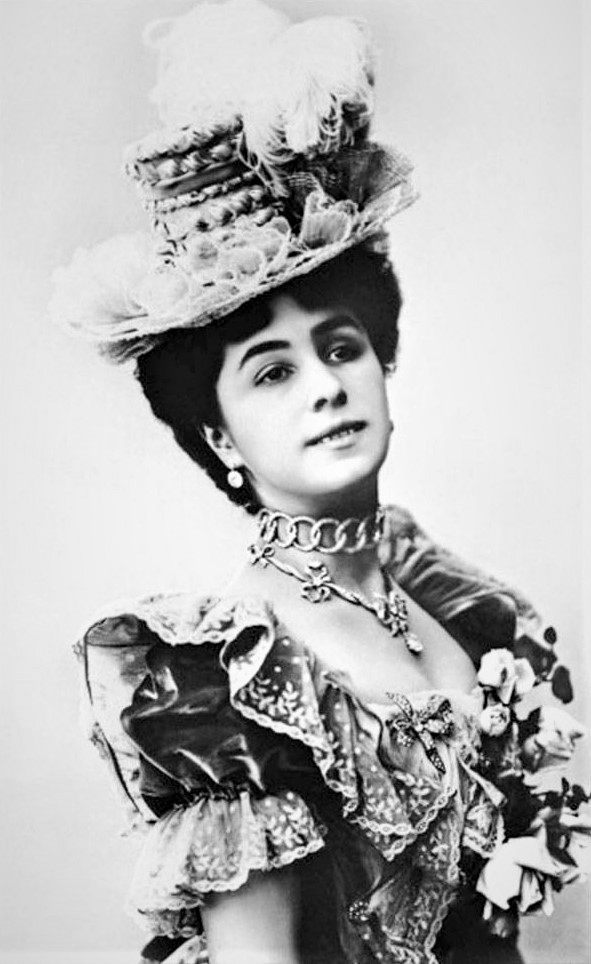
Mathilde Feliksovna Kschessinskaya
and Grand Duke Andrei Vladimirovich’s mistress and future wife:
Mathilde Feliksovna Kschessinskaya* (1872 – 1971), Prima Ballerina Absoluta of the Mariinsky Theater in St. Petersburg, was the mistress of Nicholas II, Emperor of All Russia before his marriage, then was the mistress of Grand Duke Sergei Mikhailovich and Grand Duke Andrei Vladimirovich, married Grand Duke Andrei Vladimirovich in 1921, later Grand Duke Kirill Vladimirovich, Head of the Romanov Family, gave Mathilde and her son the surname Romanovsky-Krasinsky, and they were formally styled Princess Maria Romanovsky-Krasinsky and Prince Vladimir Andreievich Romanovsky-Krasinsky

Mathilde Feliksovna Kschessinskaya and Grand Duke Andrei Vladimirovich with their son Vladimir Andreievich Krasinsky
and Grand Duke Andrei Vladimirovich and Mathilde Feliksovna Kschessinskaya’s son:
Vladimir Andreievich Krasinsky (1902 – 1974) later Prince Vladimir Andreievich Krasinsky
Even though the Russian Civil War was raging, Grand Duchess Maria Pavlovna held out hope that her own eldest son Grand Duke Kirill Vladimirovich would one day be Emperor of All Russia. When other Romanovs were leaving Russia, including her son Kirill and his family, Maria Pavlovna spent 1917 – 1918 with her son Boris, her son Andrei, and his mistress Mathilde Feliksovna Kschessinskaya along with her Mathilde’s son Vladimir in the war-torn Caucasus. With the advance of the Bolsheviks, they fled to Anapa, Russia on the Black Sea, where they spent another fourteen months. When the Commander of the White Army told Maria Pavlovna that the Bolsheviks were going to win the Russian Civil War, she finally agreed to go into exile. On February 13, 1920, Maria Pavlovna, her son Andrei, his mistress Mathilde and her son Vladimir boarded an Italian ship headed to Venice. They made their way from Venice to Switzerland and then to France. Grand Duchess Maria Pavlovna did not live long in exile, dying in Contrexéville, France on September 6, 1920.
This article is the intellectual property of Unofficial Royalty and is NOT TO BE COPIED, EDITED, OR POSTED IN ANY FORM ON ANOTHER WEBSITE under any circumstances. It is permissible to use a link that directs to Unofficial Royalty.
Information gathered from articles at Unofficial Royalty: Tsardom of Russia/Russian Empire Index, Wikipedia, and the resources cited below.
Works Cited
- Lincoln, W. Bruce, 1987. The Romanovs: Autocrats of All the Russias. Garden City, N.Y.: Anchor Press/Doubleday.
- Massie, Robert K., 1995. The Romanovs: The Final Chapter. New York: Random House.
- Perry, John Curtis and Pleshakov, Konstantin, 2008. The Flight of the Romanovs. New York: Basic Books.
- Sole, Kent and Gilbert, Paul, 1994. Royal Russia – The Fate of the Romanovs: The Survivors. [online] Angelfire.com. Available at: <https://www.angelfire.com/pa/ImperialRussian/directory/survivors.html> [Accessed 7 March 2022]. (Note: this article has some errors)
